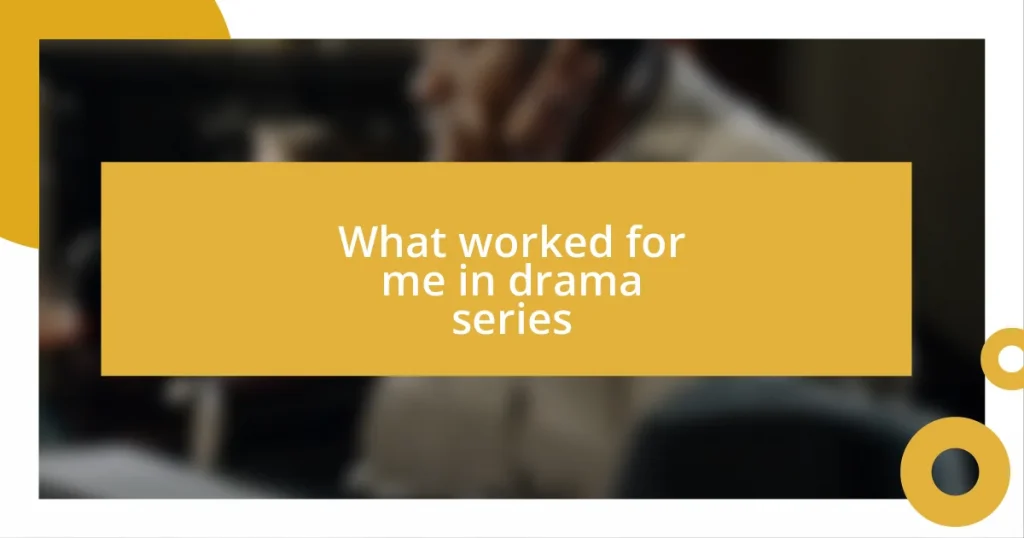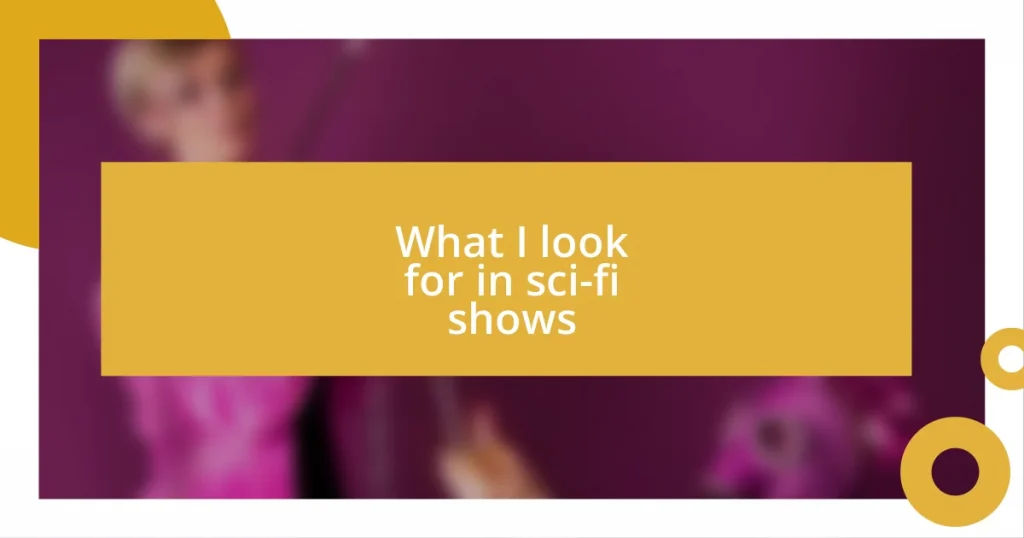Key takeaways:
- “Friends” influenced cultural norms regarding friendships, emphasizing emotional bonds beyond romantic connections.
- The show explored relatable themes such as unconditional support, romantic complexities, and personal growth through friendships.
- Its impact on television comedy is notable for blending humor with emotional depth, reshaping sitcom dynamics and audience engagement.
Cultural influence of Friends
The cultural influence of “Friends” is undeniably profound, and I often reflect on how the show’s humor and character dynamics shaped my own social interactions. Growing up, I found myself quoting lines from the show during conversations, almost instinctively turning to those familiar phrases in moments of laughter or frustration. Don’t you remember how comforting it was to share a laugh over a catchphrase? It created a bond with friends that revealed a shared cultural reference point.
Additionally, “Friends” paved the way for a new standard of friendship, impacting our expectations and relationships. I’ve noticed how the show’s portrayal of close-knit friendships resonated with my group of friends, pushing us to prioritize quality time together. Have you ever felt that pressure to create epic memories, like those hilarious moments in Central Perk? It’s fascinating how a simple coffee shop became a backdrop for meaningful conversations and bonding in both the show and in our real lives.
Moreover, the show influenced fashion and lifestyle choices in ways that still echo today. Personally, I remember rushing to the mall after episodes aired, eager to replicate Monica’s chic wardrobe or Rachel’s iconic hairstyles. It made me wonder how many people were inspired to redefine their styles and social hangouts, influenced by the charisma of these characters. Isn’t it interesting how a TV show can shape our perceptions of everyday life and even our aspirations?
Themes explored in Friends
The themes explored in “Friends” are incredibly relatable and often mirror the complexities of real-life friendships. For instance, the idea of unconditional support among friends resonates deeply with me. I can recall countless times when my own friends rallied around me during tough moments, much like how the characters consistently leaned on one another for emotional support. Have you ever felt that sense of companionship when a friend simply shows up when you need them the most?
Romantic relationships also take center stage throughout the series, often highlighting the balance between love and friendship. I vividly remember my own experiences navigating the delicate dance of dating within my friend circle. It can be both exhilarating and nerve-wracking, can’t it? Just like Ross and Rachel or Monica and Chandler, I’ve found that friends often help us make sense of our romantic entanglements, providing insights that we might overlook ourselves.
Finally, the theme of personal growth permeates “Friends,” as we witness each character evolve over ten seasons. I think about my own journey and how my friendships have shaped the person I am today. There were moments when I made mistakes, and I learned valuable lessons that helped me grow, much like the characters did. Isn’t it remarkable how friendship can serve as a catalyst for self-discovery and personal development?
| Theme | Description |
|---|---|
| Unconditional Support | The friends consistently provide emotional backing for one another’s struggles. |
| Romantic Relationships | The show portrays the complexities of balancing love and friendship. |
| Personal Growth | Each character evolves, illustrating how friendships contribute to self-discovery. |
Friends and societal norms
The interplay between “Friends” and societal norms is fascinating to me. The show often challenged traditional views of relationships by showcasing a diverse set of friendships that transcended gender norms. I remember an episode where Ross and Rachel grappled with their evolving bond, which prompted me to think about how my own friendships, regardless of gender, have blossomed in unexpected ways. Have you ever found that the boundaries of friendship sometimes blur, allowing for deeper connections? It’s like how we instinctively seek comfort and camaraderie beyond societal expectations.
Here are some ways “Friends” has influenced societal norms around friendship:
- Redefinition of Friendship: The show’s depiction of deep emotional ties between friends challenged the notion that intimate bonds must be romantic.
- Diverse Relationship Models: By presenting varied friendships, it encouraged viewers to embrace close friendships regardless of gender.
- Normalizing Vulnerability: Characters frequently expressing their feelings fostered an environment that valued emotional openness among friends.
- Shared Living Spaces: The portrayal of friends living together popularized cohabitation among platonic friends, shifting societal views on living arrangements.
Reflecting on these points reminds me of my own circle where platonic friendships often mimic the closeness depicted in “Friends.” The cultural shifts initiated by this iconic series have undoubtedly made a lasting impact on how I and many others approach and appreciate our friendships.
Friendship lessons from Friends
When I look back at “Friends,” I can’t help but think about the importance of unconditional support in our lives. There’s something comforting about knowing your friends will always have your back. I remember a time when a close friend of mine was going through a tough breakup. It was during that period that I truly understood what it meant to be there for someone—just like how Joey was always the first to show up for Chandler. Have you ever dropped everything for a friend in need?
The show also brilliantly illustrates that friendships can sometimes be complicated. Take the Ross and Rachel dynamic—it really makes you reflect on how feelings can change within a group of friends. I’ve had my share of confusing situations where the lines between friendship and romance blurred. Those moments are both thrilling and terrifying, showing just how nuanced our relationships can be. Isn’t it fascinating how a simple conversation can shift everything?
Lastly, I appreciate how “Friends” highlights the idea of personal growth through friendship. Watching characters navigate their lives while leaning on each other reminds me of my own experiences. I once learned a significant lesson about accountability after a friend called me out on a mistake. It truly taught me that real friends help us become better versions of ourselves. Do you think our friends influence our decisions in ways we don’t even realize? I certainly do!
Impact on television comedy
The impact of “Friends” on television comedy is profound. It changed the landscape of sitcoms by blending humor with emotional depth, allowing audiences to laugh while also connecting with the characters’ struggles. I remember watching a particularly funny episode where the gang tries to help Ross avoid a bad date, and while I was doubled over in laughter, I couldn’t help but relate to their camaraderie and how it mirrored the support I’ve experienced with my own friends.
One of the standout features of “Friends” is its memorable catchphrases and running gags. From “We were on a break!” to Joey’s “How you doin’?”, these phrases became part of popular culture. Personally, I’ve caught myself quoting these lines in social settings, effortlessly sparking conversations and laughter. It’s interesting to see how a simple line can bridge connections among viewers, creating a shared language that resonates beyond the screen.
Moreover, the show’s influence can be seen in the structure of many comedies that followed. The ensemble cast dynamic, where each character plays a vital role, has become a blueprint for many series today. Reflecting on this, I often find myself drawn to newer shows that attempt to recapture that magic, yet it’s rare to find one that matches the perfect balance of humor and heart that “Friends” nailed so effortlessly. The nostalgia I feel when tuning into reruns is a testament to how significant its impact has been on our understanding of friendship in a comedic context.
Friends and mental health discussions
There’s something quite powerful about discussing mental health with friends. I remember confiding in my best friend about my struggles with anxiety one evening; just having her listen made me feel lighter. It made me realize how vital it is to have those dialogues openly without fear of judgment—like a safe space where we can share our vulnerabilities. Have you ever felt the weight of unexpressed emotions lifted simply by talking?
In “Friends,” we see characters navigating their own mental health challenges, often turning to one another for solace. Monica’s obsessive tendencies and Ross’s insecurities are relatable struggles that many face. These portrayals remind me of conversations I’ve had with friends who battled similar issues, and it’s reassuring to see that we’re not alone in these experiences. Isn’t it amazing how relatable stories can encourage us to vocalize our own feelings?
Moreover, the impact of humor can’t be underestimated in these discussions. The gang often used laughter to cope with their problems, showing that it’s okay to mix lightheartedness with serious conversations. I fondly remember a time when a group of friends helped me laugh through a tough situation, and it made all the difference. How often do we find comfort not just in the discussions but in the joy that comes from sharing laughter with those we care about?












